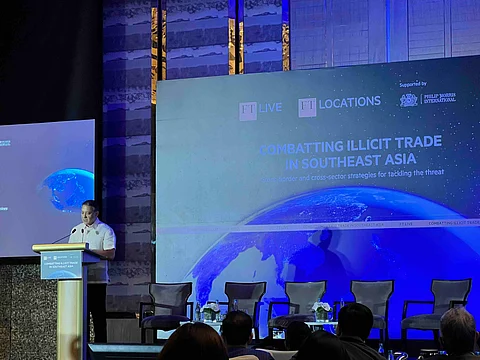
- NEWS
- the EDIT
- COMMENTARY
- BUSINESS
- LIFE
- SHOW
- ACTION
- GLOBAL GOALS
- SNAPS
- DYARYO TIRADA
- MORE

The Philippines is bleeding $2 billion (P114 billion) in lost revenues due to the proliferation of illicit tobacco trade in the country, a consultancy firm said at a forum on Tuesday.
“The Philippines is losing $2 billion in terms of losses in tobacco alone. That’s a large number, and it’s getting bigger. Not just tobacco — alcohol and medicines are becoming problematic as well in terms of illicit trade,” said Rohan Pike of a Melbourne, Australia-based consulting company that provides premier investigative services to the public and private sectors. He made the remarks at the sidelines of the Combatting Illicit Trade in Southeast Asia forum organized by the Financial Times and supported by Philip Morris International.
He said the Philippines is both a transit and destination country for illicit trade, while Singapore and Malaysia serve primarily as transit hubs.
Illicit tobacco and vapes, he noted, are being produced in Cambodia, China, and Indonesia.
“The government should understand and analyze the cause of illicit trade, which is the price of the legal product as to the illegal product. Illicit trade of tobacco in the Philippines and most other countries is self-inflicted, and it’s caused by internal policy, and perhaps a desire to gain revenue. The best way to suppress illicit trade is to fix the current policy,” he said.
Meanwhile, Jericho Nograles of the Philippine Tobacco Institute disclosed that in the Philippines, 1 out of 5 cigarettes is fake, making up 20 percent of the cigarette market by the end of 2024 — up from just 3 percent pre-pandemic.
“This year, we are still seeing a rise of illicit tobacco trade based on our monitoring, not because of the lack of enforcement, but a lack of successful prosecution,” he said in an ambush interview.
“Most governments are not talking about illicit trade. Why? Because it’s embarrassing. Any illicit trade reflects badly on any government. It’s an embarrassment to enforcement and policy, as well as cross-border security. Illicit trade is alive because no one wants to admit that it exists,” he added.
He recommended the government establish a dedicated composite task force to combat illicit trade in tobacco, which contributes P160 billion annually in excise taxes.
“The task force should be composed of the BIR, the Bureau of Customs, the Department of Finance, and the Department of Justice to have a whole-of-government approach. It should not be enforcement-focused but prosecution-focused,” Nograles said.
Bureau of Internal Revenue (BIR) Commissioner Romeo Lumagui Jr. admitted during the forum that the government has very limited resources and personnel to combat illicit trade.
“The losses (definitely) amount to several billions, it’s (really) substantial. If we address illicit trades, it will help us in our collection targets,” he said.
He added that the Philippines’ archipelagic nature makes it more vulnerable to smuggling, compounded by budget and manpower constraints.
“We lack personnel, that is why we are coordinating with the National Bureau of Investigation and the Philippine National Police-CIDG for assistance. Also, we lack funding. Part of the excise tax should go to the BIR enforcement and to establish laboratories. Unfortunately, the budget has not yet been released to us. But we have already applied for its release,” Lumagui said.
He added: “In particular vapes, all of those that we intercepted are imported. Rest assured that we will continuously do our raids so that we can help the Bureau of Customs. We have already destroyed the seized cigarettes and vapes so that they will not return to the market.”
He said illicit cigarettes and vapes are now being hidden in residential homes and subdivisions.
In March 2025, the BIR in Pampanga destroyed around 14.3 million packs of illicit cigarettes seized during various operations, with an estimated tax liability of P6.3 billion, as part of its ongoing efforts to remove untaxed products from circulation.
The BIR also recently filed an P8.5 billion tax evasion case against Chinese nationals and several corporations after raiding an illegal cigarette factory and multiple warehouses in San Simon, Pampanga.
